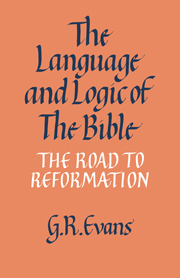Book contents
- Frontmatter
- Contents
- List of abbreviations
- List of sources
- Biographical notes
- Introduction
- I Scripture's divine warrant
- 1 ‘Scripture hath for its author God himself’
- 2 The human authors of Scripture
- 3 Handing on and explanations
- 4 Sola scriptura
- 5 Towards private judgement: ‘The children of God spy out their father’
- II The rules of interpretation
- III Practical interpretation
- Conclusion
- Notes
- Select bibliography
- Index
1 - ‘Scripture hath for its author God himself’
from I - Scripture's divine warrant
Published online by Cambridge University Press: 12 October 2009
- Frontmatter
- Contents
- List of abbreviations
- List of sources
- Biographical notes
- Introduction
- I Scripture's divine warrant
- 1 ‘Scripture hath for its author God himself’
- 2 The human authors of Scripture
- 3 Handing on and explanations
- 4 Sola scriptura
- 5 Towards private judgement: ‘The children of God spy out their father’
- II The rules of interpretation
- III Practical interpretation
- Conclusion
- Notes
- Select bibliography
- Index
Summary
During the sixteenth century the Church in the West ceased to be a single body of the faithful. The Protestant reformers brought about a division in which lay many further divisions. Thomas Stapleton (1535–98), the English Catholic polemicist, sneers at the multiplicity and confusion of protestant beliefs:
Now, so ye be no priest, ye may be a Sacramentary, an Anabaptist, or a Lutheran; and then a Civil, a Zealous or a Disordered Lutheran, among all which ye may choose of what sort in each branch ye list to be; whether ye allow two sacraments with the Zealous Lutherans, three with the Leipsians or four with the Wittenbergers; whether ye will be an Osiandrin, a half-Osiandrin or an Antiosiandrin.
In the web of politics, social and economic change and religious and theological developments which brought about this fragmentation one continuous thread is visible from at least the beginning of the fourteenth century. Those scholars and preachers and demagogues (Marsilius of Padua, Wyclif and the Lollards, the Hussites, for example) who challenged the authority of the Church as it was then institutionally constituted, held up the authority of the Bible in its place and argued that the interpretation of Scripture was no matter for the Church to regulate if by the Church was meant the Pope and his cardinals. Instead, the individual must read for himself under the guidance of the Holy Spirit.
The study of the Bible had always formed the basis of Christian theological endeavour; so much so that it was not until the twelfth or thirteenth century that the word ‘theology’ came into use in the schools of the West alongside ‘the study of the Sacred Page’.
- Type
- Chapter
- Information
- The Language and Logic of the BibleThe Road to Reformation, pp. 7 - 14Publisher: Cambridge University PressPrint publication year: 1985



